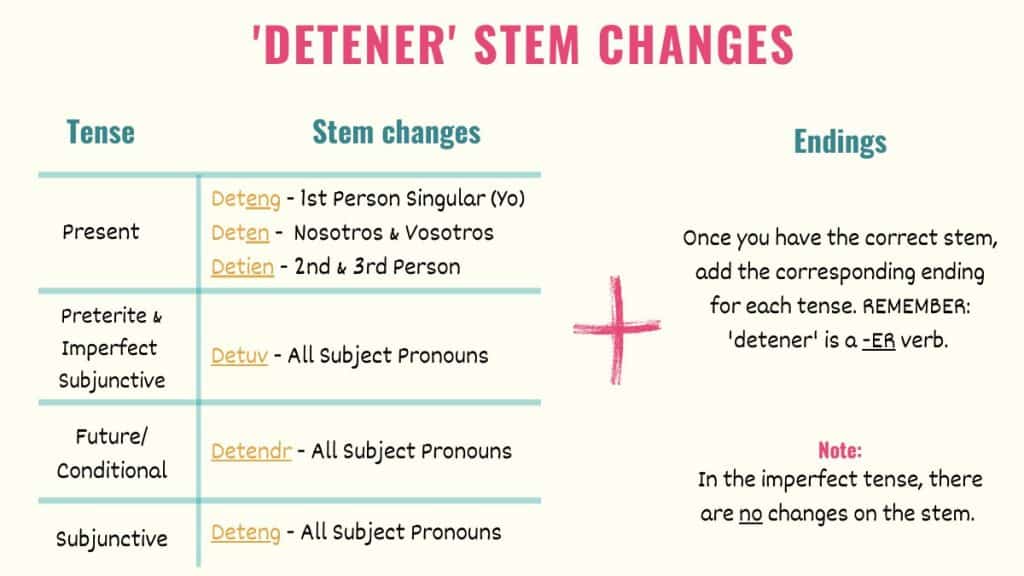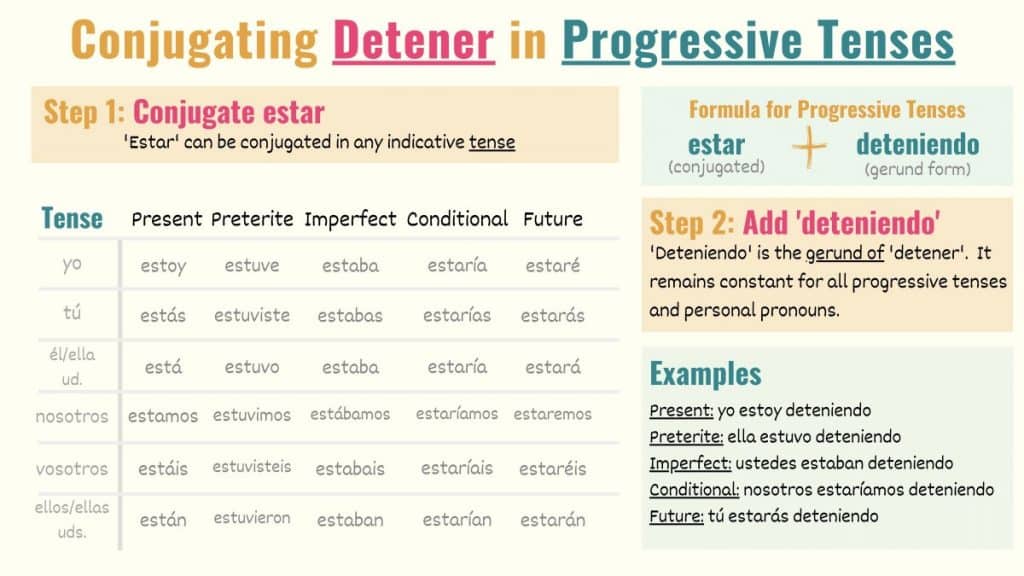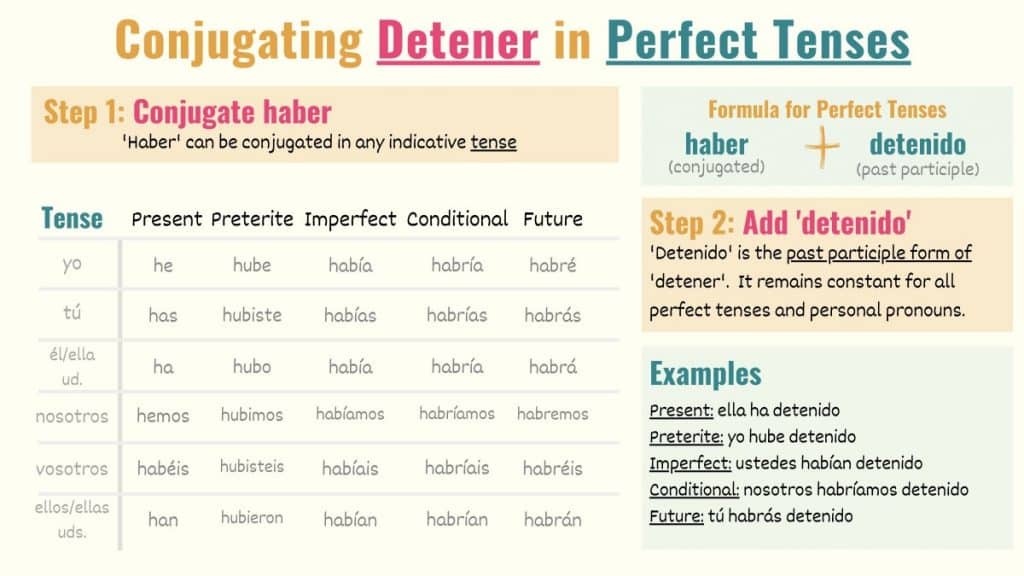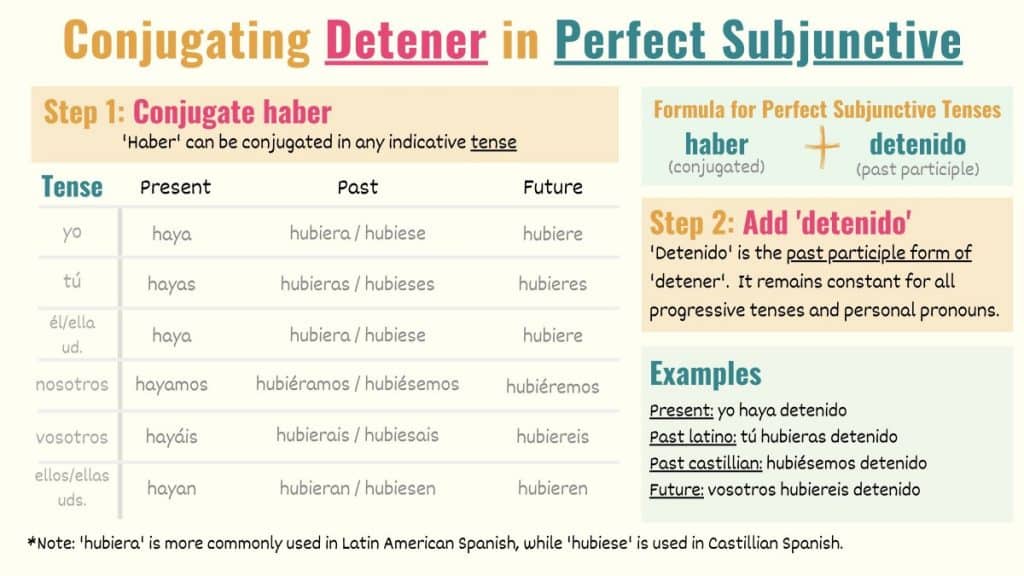In this short guide, we will cover the following topics for ‘Detener’ in Spanish:
- What does ‘Detener’ mean?
- ‘Detener’ Conjugations
- How to Use ‘Detener’ in Spanish
- Expressions & Idioms with ‘Detener’
- Synonyms of ‘Detener’ in Spanish
What does ‘Detener’ mean?
Definition – ‘Detener’ is the direct translation of ‘to stop’ or ‘to detain’. As a result, it is used to express that a person has interrupted an activity or stopped someone. In other contexts, ‘detener’ is also used to talk about detaining someone.
Below are some examples of the different translations that ‘detener’ can have in Spanish.
- When talking about stopping an action, movement or someone, it is translated as ‘to stop’ or ‘to cease’.
- If describing that a person was arrested or detained, ‘detener’ means ‘to apprehend’, ‘to arrest’ or ‘to detain’.
‘Detener’ Conjugations
In Spanish, ‘detener’ has some irregularities depending on the person and the tense that you’re conjugating it to. Also, with certain meanings, ‘detener’ is a pronominal verb which means that you’ll need to include either an object or reflexive pronoun.

Take Note: If you notice, ‘detener’ is formed with the prefix ‘de’ and the verb ‘tener’. This means that ‘tener’ and ‘detener’ share the same conjugation.
Indicative
Present tense conjugation
In the present tense, ‘detener’ uses three stems:
- The irregular stem ‘detien’ for the 2nd person singular and 3rd person singular and plural.
- ‘Deteng’ is only used for the 1st person singular (yo).
- ‘Nosotros’ and ‘vosotros’ will be working with ‘deten’.
Below, I’ve underlined the endings that you need to add to these stems.
| Person | Conjugation | Translation |
|---|---|---|
| Yo | detengo | I stop |
| Tú | detienes | You stop |
| Él / Ella / Usted | detiene | He/She stops |
| Nosotros | detenemos | We stop |
| Vosotros | detenéis | You stop |
| Ustedes / Ellos / Ellas | detienen | They/You stop |
Preterite tense conjugation
‘Detener’ in the preterite tense is an irregular verb. To conjugate to this tense, you’ll need to use the stem ‘detuv’.
| Person | Conjugation | Translation |
|---|---|---|
| Yo | detuve | I stopped |
| Tú | detuviste | You stopped |
| Él / Ella / Usted | detuvo | He/She stopped |
| Nosotros | detuvimos | We stopped |
| Vosotros | detuvisteis | You stopped |
| Ustedes / Ellos / Ellas | detuvieron | They/You stopped |
Imperfect tense conjugation
| Person | Conjugation | Translation |
|---|---|---|
| Yo | detenía | I stopped |
| Tú | detenías | You stopped |
| Él / Ella / Usted | detenía | He/She stopped |
| Nosotros | deteníamos | We stopped |
| Vosotros | deteníais | You stopped |
| Ustedes / Ellos / Ellas | detenían | They/You stopped |
Future tense conjugation
‘Detener’ is irregular in the future tense, too. Notice that, in this case, you need to add the future endings to the irregular stem ‘detendr’.
| Person | Conjugation | Translation |
|---|---|---|
| Yo | detendré | I will stop |
| Tú | detendrás | You will stop |
| Él / Ella / Usted | detendrá | He/She will stop |
| Nosotros | detendremos | We will stop |
| Vosotros | dentendréis | You will stop |
| Ustedes / Ellos / Ellas | detendrán | They/You will stop |
Conditional tense conjugation
In the conditional tense, ‘detener’ is conjugated with the irregular stem ‘detendr’.
| Person | Conjugation | Translation |
|---|---|---|
| Yo | detendría | I would stop |
| Tú | detendrías | You would stop |
| Él / Ella / Usted | detendría | He/She would stop |
| Nosotros | detendríamos | We would stop |
| Vosotros | detendríais | You would stop |
| Ustedes / Ellos / Ellas | detendrían | They/You would stop |
Progressive Tenses

Ten cuidado, los carros se están deteniendo.
Be careful, the cars are stopping.
Perfect Tenses

Hemos detenido la película para ir a la tienda.
We have stopped the movie to go to the store.
Creí que la policía había detenido al ladrón.
I thought that the police had detained the thief.
Detener Subjunctive Conjugations
Present subjunctive conjugation
As an irregular verb, to conjugate ‘detener’ to the present subjunctive, you’ll use the ‘deteng’ for all the subjects. Remember that these spelling changes in the stem are done to keep the pronunciation consistent.
| Person | Conjugation | Translation |
|---|---|---|
| Yo | detenga | To stop |
| Tú | detengas | To stop |
| Él / Ella / Usted | detenga | To stop |
| Nosotros | detengamos | To stop |
| Vosotros | detengáis | To stop |
| Ustedes / Ellos / Ellas | detengan | To stop |
Imperfect subjunctive conjugations
To conjugate to the imperfect subjunctive, ‘detener’ uses the same stem that you used in the preterite tense. So, for this conjugation, you’ll use again the stem ‘detuv’.
| Person | Conjugation | Translation |
|---|---|---|
| Yo | detuviera / detuviese | I stopped |
| Tú | detuvieras / detuvieses | You stopped |
| Él / Ella / Usted | detuviera / detuviese | He/She stopped |
| Nosotros | detuviéramos / detuviésemos | We stopped |
| Vosotros | detuvierais / detuvieseis | You stopped |
| Ustedes / Ellos / Ellas | detuvieran / detuviesen | They/You stopped |
Perfect subjunctive

Si te hubieras detenido, no habríamos chocado.
If you had stopped, we wouldn’t have crashed.
Espero que hayan detenido al culpable.
I hope that they have arrested the culprit.
Imperative
Imperative conjugation
| Person | Conjugation | Translation |
|---|---|---|
| Tú | detén | Stop |
| Nosotros | detengamos | Let’s stop |
| Vosotros | detened | Stop |
| Ustedes | detengan | Stop |
[‘Detener’ conjugated in imperative] + a + [noun]
¡Detengan a ese tipo, me asaltó!
Stop that guy, he assaulted me!
Deténganse, no pueden cruzar esa línea.
Stop, you can’t cross that line.
Keep in mind that negative commands are conjugated by following the present subjunctive conjugation and adding the word No to the sentence.
No + [‘detenerse’ present subjunctive] + [complement]
No te detengas a mitad de la calle, puedes ocasionar un accidente.
Do not stop in the middle of the road, you may cause an accident.
Por favor, no lo detenga, es inocente.
Please, don’t arrest him, he’s innocent.
How to Use ‘Detener’ in Spanish with Examples
‘Detener’ in Spanish is used in two main ways:
- Talking about stopping something or someone
- Talking about arresting someone
In the sections below, you’ll find different examples that will help you understand how to use ‘detener’ in each context.
Talking about stopping something or someone
Since it’s the direct translation of ‘to stop’ or ‘to cease’, in Spanish, ‘detener’ is used to express that a person interrupted an action or stopped someone from doing something. Here are some examples of how to apply this meaning.
[‘Detener’ conjugated] + [noun] + [complement]
Detendremos el proyecto por falta de tiempo.
We will stop the project due to a lack of time.
¡Detén el auto! ¡Vamos a chocar!
Stop the car! We’re going to crash!
Ayer detuvimos a Luke para preguntarle la tarea.
Yesterday we stopped Luke to ask him for the homework.
You can also use ‘detener’ to talk about the actions that you stopped on your own or that someone else forced you to stop. Notice that, depending on who you’re referring to, you’ll need to use a direct object or a reflexive pronoun.
[Direct or reflexive pronoun] + [‘detener’ conjugated] + [complement]
Nos detuvimos 10 minutos en la gasolinera.
We stopped for 10 minutes at the gas station.
Me detuve porque empezó a llover.
I stopped because it started to rain.
Nos detuvieron porque no teníamos puesto el cinturón de seguridad.
We were stopped because we were not wearing our seat belts.
La detuvieron porque no tenía licencia de conducir.
They stopped her because she didn’t have her driver’s license.
Talking about arresting someone
Given that ‘detener’ is also the direct translation of ‘to detain’, ‘to arrest’ or ‘to apprehend’, this verb is also used to describe that the police or a law enforcement officer detained a person that might have committed a crime.
[‘Detener’ conjugated] + a + [subject] + [complement]
Detuvieron a 2 personas por robo de autos.
Two people were arrested for car theft.
En unos días detendremos a los asaltantes.
In a few days, we will apprehend the thieves.
Los policías detuvieron al presunto culpable de haber atropellado al ciclista.
Police officers detained the culprit they believed had run over the cyclist.
Detener Expressions & Idioms
Here are some idiomatic expressions with ‘detener’ that can help you communicate your ideas better.
Detener el tiempo: It expresses that, for some reason, time passes so slowly that it seems that it stopped. It can be translated as ‘time stands still’ or ‘to stop time’.
Detenerse a pensar: We can use this verb to express that someone needs to take some time to think about the actions he or she is going to perform. It can be translated as ‘to take some time’, ‘to stop and think’.
Synonyms of ‘Detener’ in Spanish
Parar(se): This is another verb that is used to express that someone or something has been stopped. It also means ‘to stop’.
Cesar: This is the direct translation of ‘to cease’. It means that something has come to an end or that someone stopped doing an activity.
Interrumpir: This verb means to prevent someone from continuing what they were doing or stopping something from functioning. Its translation is ‘to interrupt’.
Arrestar: When talking about apprehending or detaining someone, this verb is the direct translation of ‘to arrest’ and can be used instead of ‘detener’.
Aprehender: This verb means to arrest a person who has committed a crime. In this context, we can use it instead of ‘detener’ and is translated as ‘to apprehend’.
Related Resource:
How to Say ‘Stop’ in Spanish: Parar, Detener or Alto?



